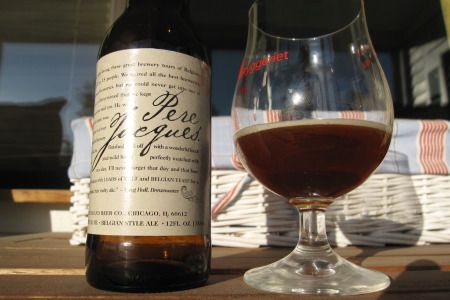Brews You Can Use

Dinner Beers
My father waged a thirty-year battle in favor of beer. When he moved to our micropolitan area, it was understood that classy people didn't drink beer. Everyone drank hard liquor. That was 1969. But he stuck to his guns, drinking water if they didn't have beer. Eventually, hosts started making sure they stocked a few beers for Mel. Eventually, more and more people started drinking the beer. By the 1980s, it was an established beverage in our town.
It wasn't just the Mighty Mel, of course. Beer made great strides from blue collar backwaters to mainstream acceptance between the 1960s and 1980s.
But it still hasn't penetrated all areas. As a dinner drink, wine still dominates beer.
Goose Island has found religion, and alongside its old standbys, has started to churn out edgier, higher-end beers. Its Bourbon County Stout is a 13 percent ABV bomb with a dark rainbow of malt, chocolate, and raspberry flavors; it's like drinking liquefied (and heavily spiked) Black Forest cake. Like good wine, BCS is best stored for at least six months, to let the alcohol mellow a bit. (Along with the brewery's regular-production BCS, this year it's putting out a few limited-release expressions, including coffee, vanilla bean, and "rare," aged in Pappy Van Winkle bourbon barrels.)
More to the point, though, is the marketing. Instead of whimsical cartoons, Goose Island's high-end beers have serious, bespoke designs, looking not unlike ... wine bottles.
The Bourbon County Stout label, for instance, is all sober serifed script and ruled lines, with the release year prominently displayed. The same goes for Goose Island's line of Belgian-style beers: Sofie (farmhouse ale), Matilda (Belgian pale ale), Juliet (Belgian sour ale), Pere Jacques (abbey ale), and the upcoming Fleur (made with wild yeasts), Madame Rose (kriek), and Lolita (framboise). The minimalist labels are off-white with the names in cursive script; the casual-but-classy effect is something like what you'd expect from a small Sonoma winery run by a retired Bay Area lawyer.
